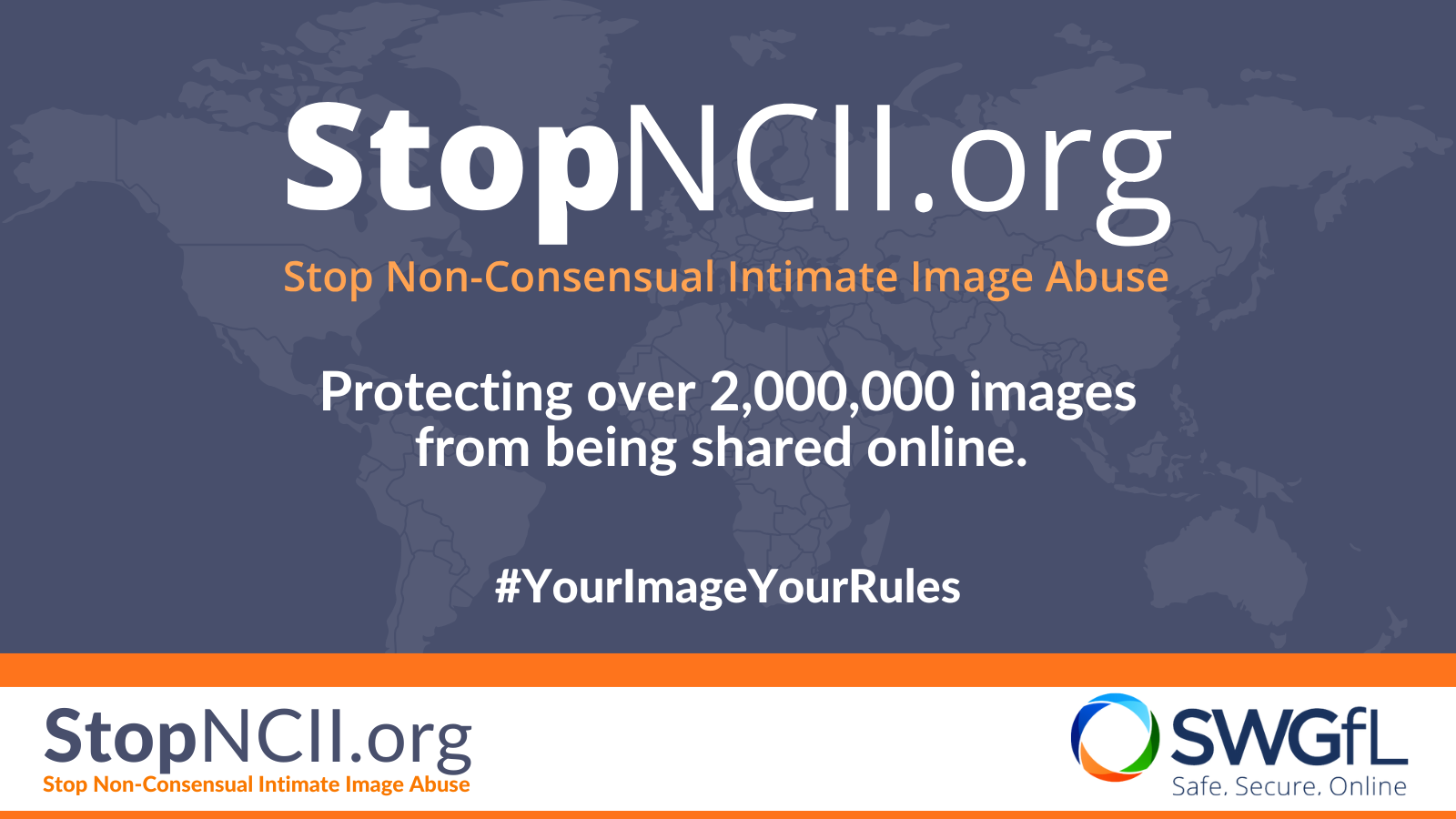
StopNCII.org Being Used to Protect 2,000,000 Images Online in the Fight Against Intimate Image Abuse
To coincide with the global 16 Days of Activism campaign, SWGfL proudly marks the four-year anniversary of StopNCII.org, the ground-breaking online tool which has become the cornerstone of global efforts to tackle intimate image abuse. Over the past year alone, StopNCII.org has charted remarkable progress: from increased victim support, global policy endorsements alongside new industry partnerships.
As part of our celebration, we are delighted to announce that BlueSky, F2F.com and SafetyKit are the latest platforms to join the StopNCII.org initiative. We can also announce that StopNCII.org is being used to protect 2 million images (a 97% increase from 2024) and has supported over 785,000 cases.
What Has StopNCII.org Achieved in 2025?
1. Global regulatory endorsement
In June 2025, the UK communications regulator Ofcom explicitly recognised StopNCII.org as a “leading global example of this approach” in its consultation on the Online Safety Act 2023, noting the service enables proactive prevention of NCII distribution without requiring platforms to view content. Outside of the UK, StopNCII.org continues to be regularly highlighted as an effective tool in NCII prevention.
2. Platform adoption and global reach
At the global NCII Summit hosted by SWGfL in London September 2025 that followed the New York NCII event in March, delegates heard the impact that StopNCII.org is having in the global response towards NCII, being shown as the leading example of how technology can be used for good in the prevention of harm.
3. Legislative momentum and alignment
The passing of the Take It Down Act in the U.S., which comes into effect in May 2026, introduced a 48-hour takedown requirement for non-consensual intimate images. StopNCII.org is cited as a ready-to-deploy technological complement to the law’s enforcement regime. We anticipate more industry platforms will require the support of StopNCII.org in helping them adhere to these new regulations.
4. The call for collective action
SWGfL continues to emphasise that “compliance alone will not solve the problem” and calls for global cross-platform hash-sharing using the StopNCII infrastructure. Additionally, we continue to highlight the urgency of early adoption and the readiness of StopNCII.org to scale globally as legislation continues to improve and the expectations on platforms continue to develop.
Practice and Prevention
StopNCII.org has quickly matured from a concept to a globally recognised, regulator-endorsed, survivor-centred infrastructure.
For those experiencing intimate image abuse, it means clearer routes towards protection. For digital platforms, it offers a proven, privacy-preserving tool that supports and works alongside their own systems. For policymakers and regulators, it demonstrates that technology, policy and practice can achieve meaningful global impact through collaboration.
What Do We Want to See in 2026?
As we move into the next year, several priorities stand out:
Wider platform integration: Encouraging more platforms to integrate StopNCII.org to reduce the spread of NCII.
Global coordination: Deepening collaboration across jurisdictions, especially where NCII content crosses borders, and aligning with legal frameworks such as the U.S. Take It Down Act and international conventions to strengthen legislation across a global scale.
Sustained focus on innovation: Anticipating and responding to emerging and developing threats. Using industry hash-sharing to support platform takedowns of NCII content and automating distribution of these hashes to partner platforms to quickly stop the further spread of content. The team are also developing a pilot project for the first of its kind Global Clearing Centre to automate NCII reporting across NGOs globally.
Progress global response towards intimate image abuse: The UN Cybercrime treaty has now been signed by 72 countries. This would require countries to establish a criminal offence for the intentional, unauthorised disclosure or sharing of an intimate image of an adult. We will work to ensure this is progressed whilst sharing best practice and sharing example of a working National Response Model towards the prevention of NCII.
Survivor-centred expansion: Ensuring that the voices and lived-experiences of survivors inform design, policy and support mechanisms.
Education & prevention culture: Beyond enforcement, promoting awareness and training around the prevention of NCII towards NGOs, Governments and law enforcement to support strengthening protections.
David Wright CBE (CEO of SWGfL) said: “The infrastructure exists, the technology is proven, and the impact is real. Compliance is the beginning, but collective action is the future. We extend our heartfelt thanks to our pioneering partner platforms who have taken up integration, our policy partners who have provided the frameworks and our global network of NGOs who continue to press for change. We still have a long way to go but we are positively changing the landscape one step at a time.’’
“Prevention of cybercrime is possible, and it is our duty to enable a society both off and online free from harm. We commend the work of StopNCII in leading the provision of a technology solution to a technology-based crime, the non-consensual sharing of intimate images as recognized internationally by the United Nations Convention against Cybercrime. Law enforcement institutions and victims have told us, again and again, that what they need is first, removing and stopping the upload of harmful material and support systems that understand the harm they face and their urgent needs. Only then, recognition, safety and access to justice are possible. Congratulations to StopNCII.org for four years of helping thousands of people, for pushing for stronger safeguards at the private sector and foremost to prevent this cybercrime from happening in the first place. We are proud to partner with you in strengthening the global response against this cybercrime.” – Nayelly Loya, Head of the Global Programme on Cybercrime, United Nations Office on Drugs and Crime.